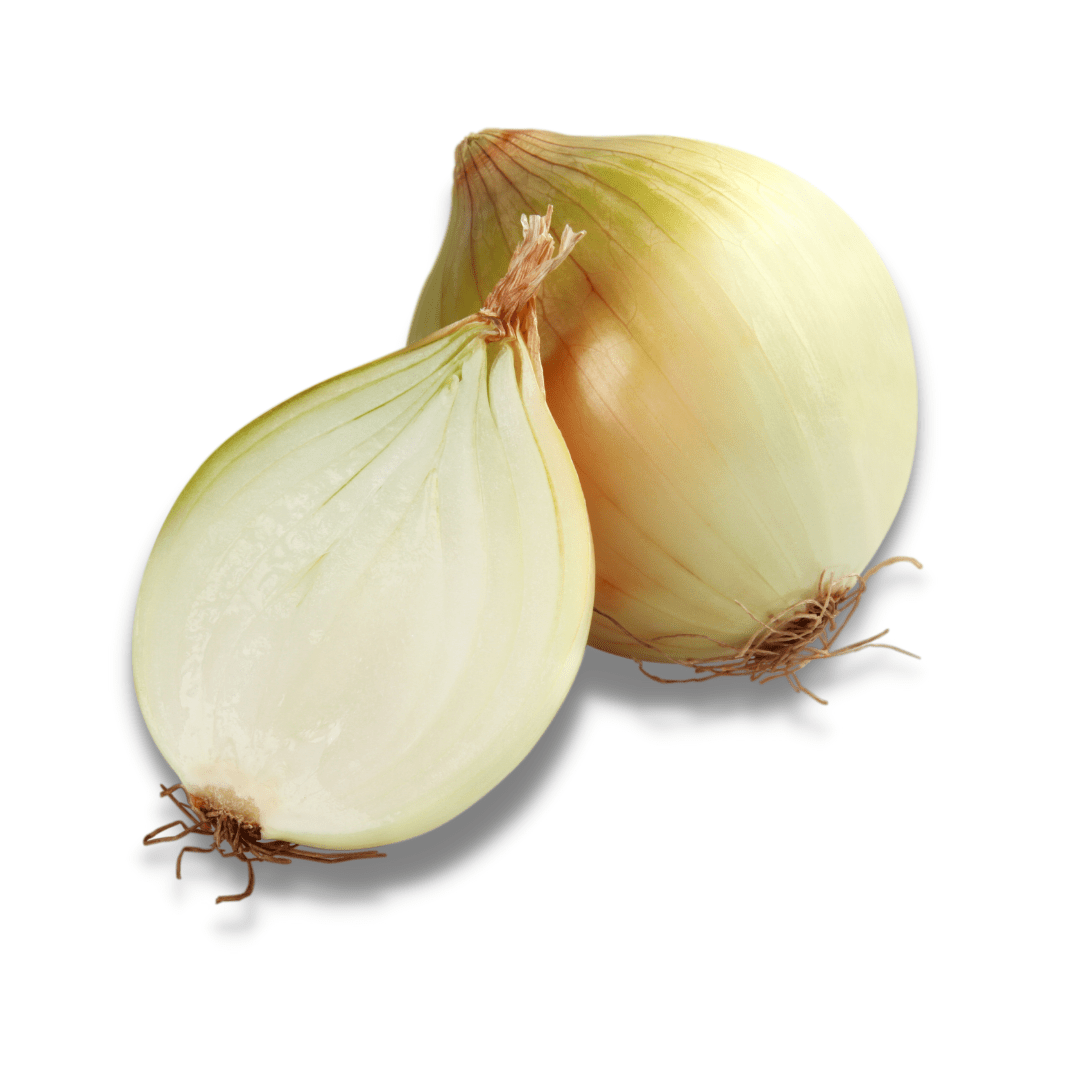About
Onion is a type of bulb vegetable that belongs to the Allium genus. It is commonly used in cooking around the world due to its distinctive flavor and aroma. The onion bulb is made up of several layers, each of which is called a “leaf” or “scale.” The outermost layer is usually dry and papery, while the inner layers are fleshy and moist.
Health Benefits of Onion:
Onions are a nutrient-dense food that is low in calories and high in fiber. Some of the potential health benefits of onions include:
-
Antioxidant properties – Onions contain several antioxidants that can help protect cells from damage caused by free radicals.
-
Anti-inflammatory properties – Onions have anti-inflammatory properties that may help reduce the risk of chronic diseases such as cancer, diabetes, and heart disease.
-
Digestive health – The fiber in onions can help promote digestive health by supporting the growth of healthy gut bacteria.
-
Immune system support – Onions are rich in vitamin C, which can help boost the immune system and promote overall health.
-
Bone health – Onions contain several minerals such as calcium, magnesium, and phosphorus that are important for bone health.
-
Blood sugar control – Onions have been shown to help regulate blood sugar levels in people with diabetes.
Diseases that can be cured by Onion:
Onions have been used for centuries to treat a variety of health conditions. Some of the diseases that can be treated with onion include:
-
Respiratory infections – Onion has been used to treat respiratory infections such as colds and flu.
-
High blood pressure – Onions contain compounds that can help lower blood pressure and reduce the risk of heart disease.
-
Digestive disorders – Onions can help alleviate symptoms of digestive disorders such as irritable bowel syndrome and acid reflux.
-
Diabetes – Onions have been shown to help regulate blood sugar levels in people with diabetes.
Energy, Macro Nutrient, and Water Content in Onion per 50-gram serving:
| Nutrient | Amount |
|---|---|
| Energy | 20 calories |
| Carbohydrates | 4.7 g |
| Fiber | 0.8 g |
| Protein | 0.5 g |
| Fat | 0.1 g |
| Water | 44.5 g |
Vitamins found in Onion per 50-gram serving:
| Vitamin | Amount |
|---|---|
| Vitamin C | 4.4 mg |
| Folate | 8.6 mcg |
| Vitamin B6 | 0.1 mg |
| Vitamin B1 | 0.01 mg |
| Vitamin B2 | 0.02 mg |
| Vitamin B3 | 0.15 mg |
| Vitamin E | 0.02 mg |
| Vitamin K | 1.1 mcg |
| Biotin | 0.6 mcg |
| Vitamin A | 1.1 IU |
| Vitamin B12 | 0.0 mcg |
| Vitamin D | 0.0 IU |
Minerals found in Onion per 50-gram serving:
| Mineral | Amount |
|---|---|
| Potassium | 88 mg |
| Phosphorus | 12 mg |
| Magnesium | 4 mg |
| Calcium | 10 mg |
| Sodium | 2 mg |
| Iron | 0.1 mg |
| Zinc | 0.1 mg |
| Copper | 0.02 mg |
What are the health benefits of Onion?
Onions offer numerous health benefits, including boosting immunity, supporting heart health, aiding digestion, and possessing anti-inflammatory properties.
Is Onion good for weight loss?
Onions are low in calories and high in fiber, making them a suitable addition to weight loss diets. They provide a feeling of fullness while adding flavor and nutrients to meals.
Does Onion help with digestion?
Yes, onions contain dietary fiber that aids in digestion and promotes regular bowel movements. They can help alleviate constipation and maintain a healthy digestive system.
What vitamins are in Onion?
Onions are a good source of vitamins C and B6. Vitamin C supports immunity, while vitamin B6 plays a role in brain function and the production of neurotransmitters.
Can Onion lower cholesterol?
Onions contain compounds that may help reduce cholesterol levels. They can inhibit the production of bad cholesterol and promote the production of good cholesterol.
What are common Onion pests?
Common pests that can affect onions include onion maggots, thrips, onion flies, and nematodes. Proper crop rotation, timely planting, and implementing pest control measures can help manage these pests.
How to prevent Onion diseases?
To prevent Onion diseases, practice crop rotation, maintain proper spacing between plants, provide good air circulation, and avoid overwatering. Removing infected plants and ensuring healthy soil also help prevent diseases.
Is Onion safe for kids to eat?
Yes, onions are generally safe for kids to eat. However, it's important to introduce onions gradually into their diet and monitor for any potential allergies or digestive issues.
What are the nutrients in Onion?
Onions are rich in antioxidants, vitamins C and B6, dietary fiber, and minerals like potassium and manganese. They also contain small amounts of other vitamins and minerals.
How to store Onion properly?
Store onions in a cool, dry, and well-ventilated area. Keep them away from direct sunlight and avoid storing them with potatoes, as the gases emitted can cause spoilage. Onions with intact skins have a longer shelf life.
Are there any side effects of Onion consumption?
While onions are generally safe to consume, some individuals may experience heartburn, stomach discomfort, or allergic reactions. Moderation is key, and it's advisable to consult a healthcare professional if any adverse effects are experienced.
Can Onion improve skin health?
Onions contain antioxidants that help combat free radicals and promote healthy skin. They may help improve skin texture, reduce signs of aging, and provide a natural glow.
Does Onion help with hair growth?
Onions have sulfur compounds that may promote hair growth and improve hair health. Applying onion juice or onion-infused oil to the scalp may help nourish hair follicles.
Is Onion beneficial for heart health?
Yes, onions have heart-healthy properties. They can help reduce blood pressure, lower cholesterol levels, and improve overall cardiovascular health when consumed as part of a balanced diet.
How does Onion support the immune system?
Onions contain antioxidants, particularly vitamin C, which supports the immune system by fighting against harmful free radicals and boosting the body's natural defenses.
Can Onion be included in a diabetic diet?
Onions can be included in a diabetic diet in moderation. They have a low glycemic index and may help regulate blood sugar levels. However, it's essential to monitor blood sugar levels and consider individual dietary requirements.
What are the culinary uses of Onion?
Onions are versatile in the kitchen and used in various culinary applications. They add flavor to soups, stews, sauces, stir-fries, salads, and sandwiches, and can be caramelized, fried, or roasted as a side dish or topping.









